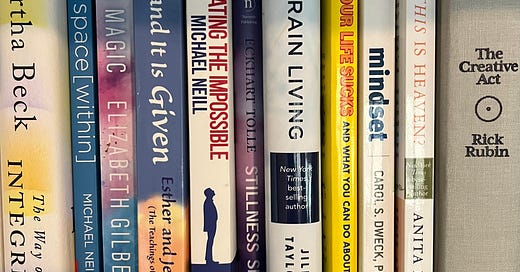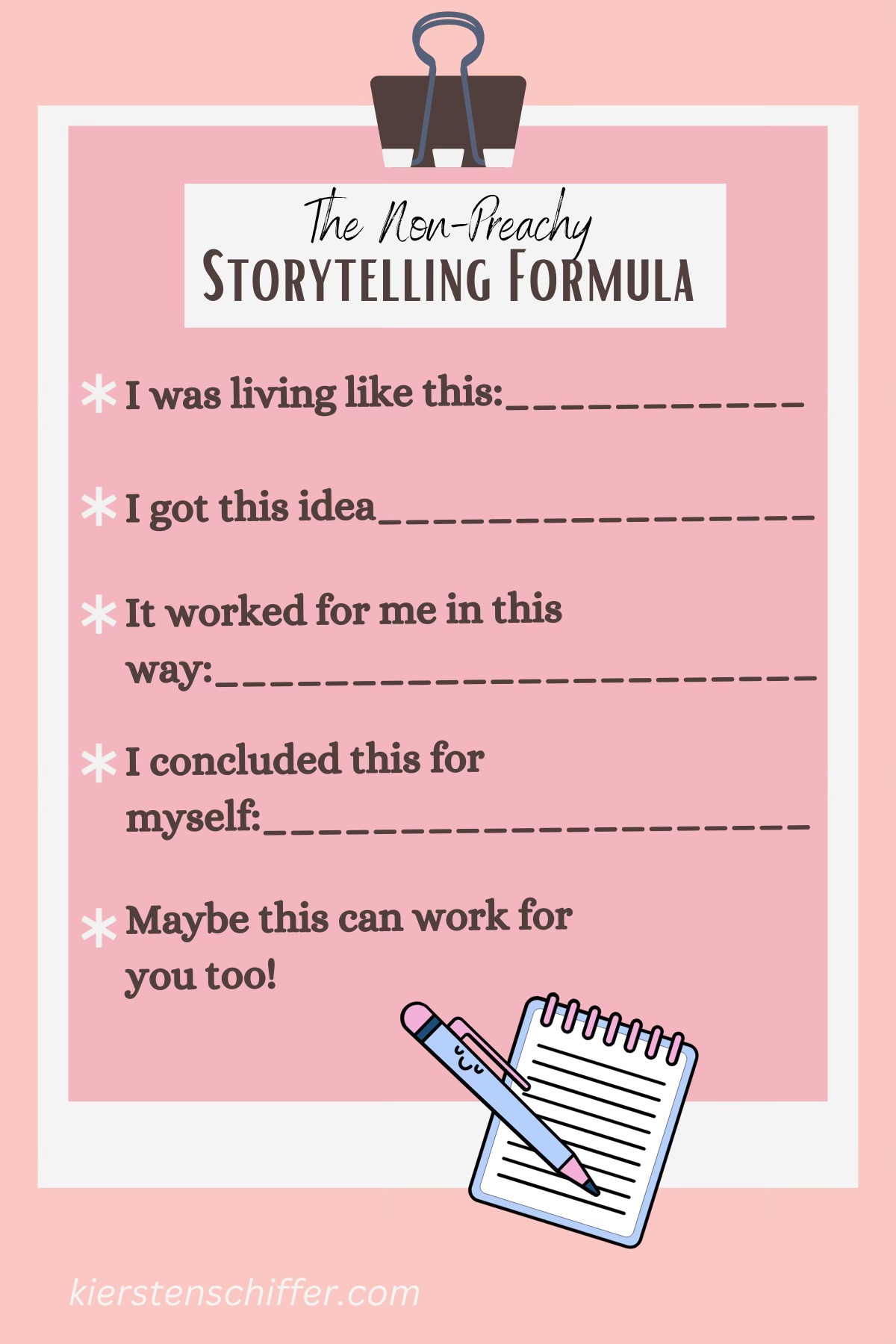Thought Bunny #3: How Can I Preach Less and Connect More?
Stumbling across my Storyteller's Formula
A few years ago, I was reading a self-help book written by a famous spiritual author. As the days passed and the pages turned, I was disturbed to find nothing about the book was sticking with me.
I couldn’t remember a thing about what I had read the day before and if you’d asked me what the book was about, I’d have a hard time telling you.
Being a woman of a certain age, my first thought was, “Well, it looks like the dementia has finally kicked in.”
But luckily my second (less dramatic) thought was, “I wonder why I’m not enjoying this book?” And when I probed further, I quickly realized what was making the information go in one ear and fly right out the other:
The author hadn’t included any personal stories in the book.
There were plenty of concepts and ideas and advice packed into each chapter. But he hadn’t included any real-life examples to help me connect those concepts to my own life.
And for me, this made the information dry and unrelatable.
And when I say dry and unrelatable information, you know what that reminded me of? School. Or being preached to by someone who has forgotten to stop and ask, “Are you still with me? Anyone have any questions?”
This experience hit upon a dilemma I grapple with not only when I write, but when I talk with others too.
How can I express my ideas without sounding too preachy or teachy?
Taking it even further I asked myself:
How can I communicate in any situation—with my spouse, friends, family—without feeling like I’m trying to shove my advice down their (most likely unwilling) throats?
After thinking about this problem for a while, I realized the self-help book’s 2 problems—no personal stories and a preachy vibe to the conceptual ideas—could have been solved by the same remedy:
The sharing of the author’s direct experience.
I know when someone speaks or writes from experiences they’ve lived themselves, those are the stories that really touch my heart.
When someone shares their ‘in-the-trenches’, juicy stories of how they faced a problem, then found a solution, those are the people I relate to so much more than a person spouting generic concepts so smooth and unremarkable there’s nothing to make them stick in my mind.
Because when I talk to a friend about a problem or search online for a solution to one of my various conundrums, I’m not looking for some supposed “expert” who demands I do exactly as they tell me to.
I’m looking for some kind of connection.
I’m looking for someone I can relate to. A person who feels like they’ve been in my shoes and, from that shared perspective, might help inspire my own unique solution. A solution that feels right to me.
Dan Blank highlights the value of this type of sharing in his human-centered marketing philosophy.
When creatives lament to Dan that they have nothing special to say that someone hasn’t already said before, he encourages them to share their everyday direct experiences.
Not what they think someone wants to hear, but the lessons they’ve personally learned as they’ve journeyed through the trenches of their own creative process. And time and time again, he finds its through that openness and vulnerability that real human connections are forged.
I chanced upon a formula for this way of communicating in an odd place. I was listening to a YouTube clip of Abraham Hicks (another spiritual speaker) at a live workshop.
A writer who was facing the same dilemma as me stood up and asked how they could help people without sounding like they were they were telling them what to do.
Abraham had a clear, step-by-step answer. One I jotted down and keep in a visible place on my desk as I write. (And have made into this lovely printable graphic below, that you can download here if you wish.)
I named it the Non-Preachy Storyteller’s Formula. And it goes like this:
I try to remember this formula, not just when I write but when talk with people too.
It’s a more relaxed way of sharing instead of giving advice. You simply speak from your own direct experience. And if it inspires someone, that’s great. And if it doesn’t, that’s okay too.
It’s a relaxed “take it or leave it” approach that feels right for me.
A trick I use to see if I’m expressing from my own lived experience and not just speaking in concepts is this:
After I’m done writing an essay, I look back over it to see how many times I’ve written the word You. Then, if I can, I try to replace that word with I or Me if possible.
Of course, this is not a rigid and hard-fast rule. We all obviously need some Yous sometimes. (I certainly have used plenty of them in this piece!)
But it can highlight where you may have slipped out of your seat next to the reader and stepped up on your soapbox instead.
I believe staying seated in your own experience, in writing and in life, creates a space of generosity, where you simply share your personal stories with a relaxed graciousness.
For me, it takes the pressure off. And without that pressure, I actually feel excited to share more of what’s happened to me and the lessons I’ve learned along the way.
And boy, is it a relief to know I don’t have to be an expert on anything other than being myself!
So, in following the Storyteller’s Formula I guess I’ll end this missive the only way I can without completely contradicting myself:
This is what occurred to me. Maybe it will help you too!
Love Bunnies
Listening: I’m getting so much inspiration from Mind-Body Coach Uma Sanghvi’s podcast where she explores the concepts taught in A Course In Miracles as well as other spiritual mystics. Her “whale week” series of shows is particularly inspiring!
Watching: I just started watching the remake of The Four Seasons on Netflix and although no one will ever be able to top Alan Alda in my heart, this star-studded cast is giving it a damn good try!
Reading: I’ve loved Amie McNee bold, brash, and truly resonant words about creating on her Instagram account for a while now. So I rushed to buy her new book “We Need Your Art” the instant it was published. It’s so inspiring! A true call to action that every single person on this Earth needs to read.






